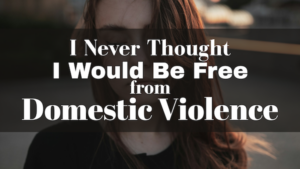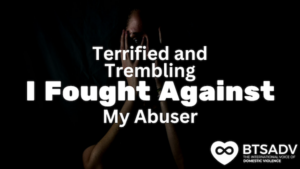I felt like a prisoner to my circumstances, and with research showing that financial abuse happens in 99% of cases of domestic violence, I know I wasn’t alone (Adams, 2011).
I was a stay-at-home mom who only worked sporadically throughout the years part-time. He was the one who made the money in the relationship. I trusted him “as a good wife should.” I had three small children who demanded a lot of time and attention. I didn’t realize what was to come.
I remember towards the end of the relationship asking him if I could have control of the finances and paying the bills. I realized that he had a huge drug problem that he had been hiding, and many of our bills were past due. I was frantic because we were on the verge of being evicted from our home. To my dismay, he refused.
Desperately, I began job searching. I didn’t know how I would afford childcare, but I had to start somewhere. I finally landed a promising job interview with a construction company working in the office. I told him about it and that I needed to get a good night’s sleep the night before the interview. That evening, he started a fight with me out of nowhere. He forcefully grabbed my phone and was very agitated. Out of fear, I jumped into the car and fled. Since I didn’t have my phone or my GPS, I drove to a friend’s house and hoped she was home. I stayed with her for a few hours until I had to get back to my house to sleep. By the time I got home and calmed down from the adrenaline that was pumping through my body, it was after 2 AM.
The next morning, I woke up exhausted. He suddenly tried to act supportive and happy for this opportunity that I had, but the damage had been done. I was a sleepy, nervous wreck. The interview went as well as it could, but unfortunately, they hired someone else within the company. It was a blow to my self-esteem. He later admitted that he purposely started that fight to sabotage me. The thought of me making money meant financial freedom, and that was the last thing that he wanted me to have.
When I hit my breaking point, I escaped one night and called numerous shelters to see if they could take my children and me. My stomach dropped as I was told by each one, “sorry, we are full.” In my shame, I went back to the abuse because I felt like I had no other choice. I didn’t see until the end that he had used money as another way to manipulate and detain me. I had to make the hardest and bravest decision of my life without any resources. I finally reached out to anyone who would listen that I needed help. It was incredibly scary to reveal the abuse, but it was even scarier to think about staying in it. My children and I were homeless for 114 days, bouncing around couches and hotels. I was exhausted and even had money stolen from me while I was homeless by my ex-husband, but I finally was able to get on my feet and be financially and physically free from the abuse.
The Cunning Tactics of Financial Abuse
So many people describe domestic violence as being physical, sexual, emotional, or mental, but financial abuse is just as damaging. As stated in the beginning, although 99% of domestic abuse cases showed to have financial abuse prevalent in them, research has revealed that a staggering 78% of the American population did not claim it as a category of domestic violence in a 2014 report (NNEDV, 2019). Financial abuse comes in many different forms. Some examples are:
Controlling every aspect of the finances
Banning their partner from getting a job
Using means to sabotage their partner from gaining work or causing them to lose their job
Not including their partner in major financial decisions
Refusal to pay bills
Wrecking their partner’s credit score as a means to keep them down
Denying their partner of necessities
Refusal to help pay for children’s needs and/or support
Holding money for themselves and not contributing to household needs
Giving their partner an allowance (NNEDV, 2017)
These circumstances can leave victims in situations of poverty, and poverty doubles the chances of domestic violence in a woman’s life. These victims also can feel shame and fear regarding asking for economic assistance. Studies show out of four domestic violence victims, three will remain with their abuser for a longer time due to financial strain. Domestic violence is a public health issue that doesn’t just affect a victim’s income but also a nation’s. Nearly 6.3 billion dollars in 2015 was spent on mental health and direct medical services in the US. This problem goes far beyond a single household. (NNEDV, 2019)
How to Get Help
If you believe you are a victim of financial abuse, contact us at Break the Silence Against Domestic Violence through our webpage or social media accounts. You can also reach out to local agencies or the National Domestic Violence Hotline at 1-800-799-SAFE. These advocates can help you come up with a safety plan, find local resources, and get the help you need.
You can also reach out to family and friends. You must break the silence to live the life that you deserve. It took me doing the same to realize that many of my loved ones were happy to either give us money, supplies, or a place to stay once they knew of my circumstances that I had hidden for so long. There’s no shame in asking for help.
Also, learn to become financially dependent. There is help for childcare vouchers through your local entities so that you can work if you are a parent. Keep your passwords and accounts private. Hold anyone who tries to financially abuse you accountable. My ex-husband refused to pay child support, so I continue to use the Department of Revenue and my local court system to hold him to this because it’s another tactic of financial abuse. I am not the same girl I used to be, and I will stand against this now in every way.
You can be free from domestic violence: physically, emotionally, mentally, AND financially.
Resources
Adams, A. E. (2011). Measuring the effects of domestic violence on women’s financial well-being. CFS Research Brief, 5. https://centerforfinancialsecurity.files.wordpress.com/2015/04/adams2011.pdf
NNEDV: National Network to End Domestic Violence. (2017). About Financial Abuse. NNEDV: National Network to End Domestic Violence. https://nnedv.org/content/about-financial-abuse/
NNEDV: National Network to End Domestic Violence. (2019). Financial Abuse Fact Sheet. NNEDV: National Network to End Domestic Violence. https://nnedv.org/resources-library/financial-abuse-fact-sheet/









